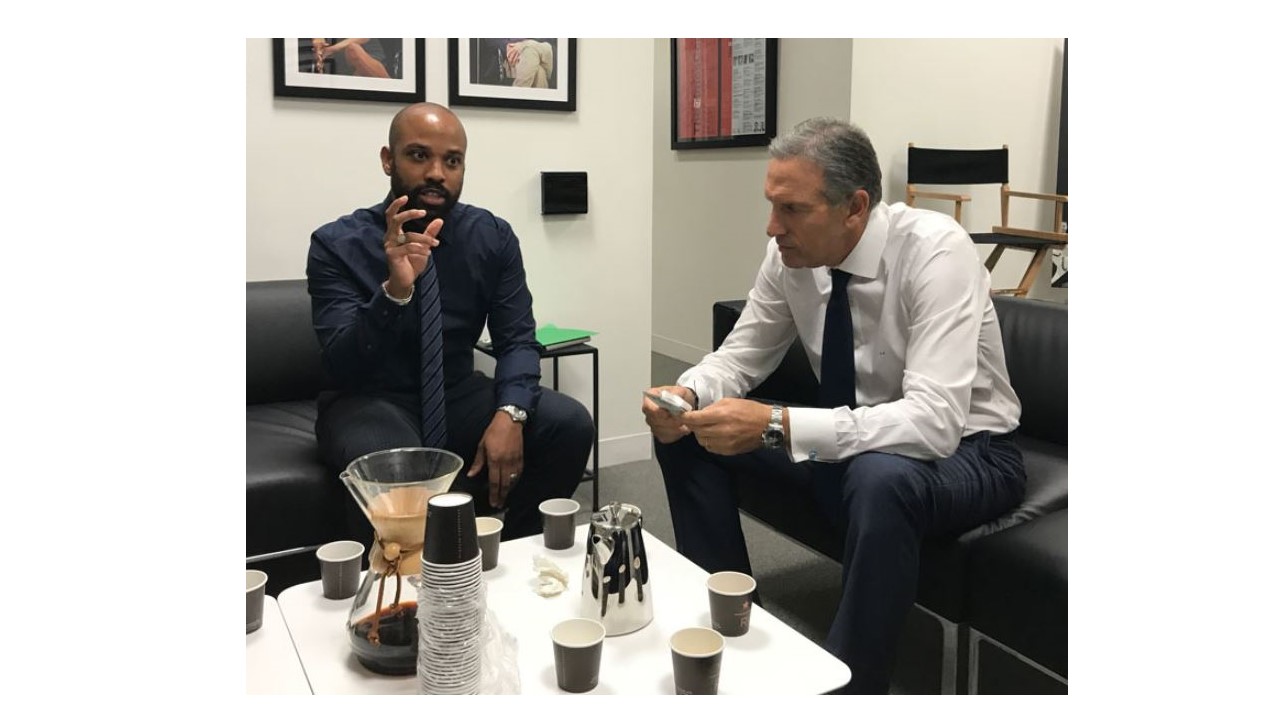Hansel Tookes, M.D., MPH, assistant professor of medicine in the Division of Infectious Diseases and a member of Sylvester Comprehensive Cancer Center at the University of Miami Miller School of Medicine, has been named one of 11 national “Upstanders” by Starbucks and is featured in a video that was screened in New York on Oct. 9. The video tells the story of Tookes’ multi-year campaign to save lives through the Infectious Disease Elimination Act (IDEA) in Florida, which allows people who inject drugs to exchange used syringes for clean ones to slow the spread of HIV and other infectious diseases.
Starbucks created “Upstanders” to “shine a light on stories of everyday Americans who are doing extraordinarily courageous things. The Upstanders featured in Season 2 are inspiring individuals whose actions represent the American spirit and the courage and compassion that is often missing from so much of today’s national dialogue.”
Tookes was a Miller School med student when he began the battle to get the Florida Legislature to approve the needle exchange. The IDEA Exchange is now a center on the edge of the medical campus and a mobile service that provides sterile syringes and supportive services to people who inject drugs.
Tookes spent the screening day in New York, meeting with Starbucks’ founder and executive chair Howard Schultz and attending the unveiling of the video that tells his story. His meeting with Schultz was in a Starbucks, of course, and a poster celebrating Tookes’ vision was front and center — there and around the world.
“Mr. Schultz pointed out that 100 million people are in Starbucks every week,” Tookes said. “He was really interested that we did this and how long it took. He saw a lot of footage when he was putting together the film, but we had never met before. It was mind-blowing.
“Seeing the poster is when I realized this was a really big deal,” Tookes said. “I got a text from D.C., a text from Boca, a text from Michigan.”
The IDEA Exchange was made possible in part by a $100,000 grant from the M·A·C AIDS Fund. The journey began in 2011 when Tookes, then a second-year medical student, published a study in the journal Drug and Alcohol Dependence showing that the number of publicly discarded needles on the streets of Miami was eight times higher than in San Francisco, a city with twice the number of people who inject drugs and long-established needle exchange programs.
In 2012, Tookes and fellow students began advocating in Tallahassee. A supporting resolution for a statewide needle-exchange law was adopted by the Florida Medical Association, and the first bills were sponsored in the spring legislative session of 2013. In 2015, the team published the results of a second study in PLOS ONE, an online journal from the Public Library of Science. The report revealed the high cost to taxpayers when people who inject drugs are treated for infections resulting from the use of dirty needles — sometimes for weeks or months — as inpatients at Jackson Memorial Hospital.
Fast forward to the morning of Oct. 9 in New York City. “It’s amazing to be here celebrating what was a multi-year campaign for human rights,” Tookes said. “In the end I have to hop on a plane tomorrow morning to get back to my patients – they were our inspiration. This is all for them.
“It’s my life and my job,” he said. “It’s truly humbling.”
If you would like to help support the IDEA Exchange, please click here or here.
For more information about the IDEA Exchange, click here.

